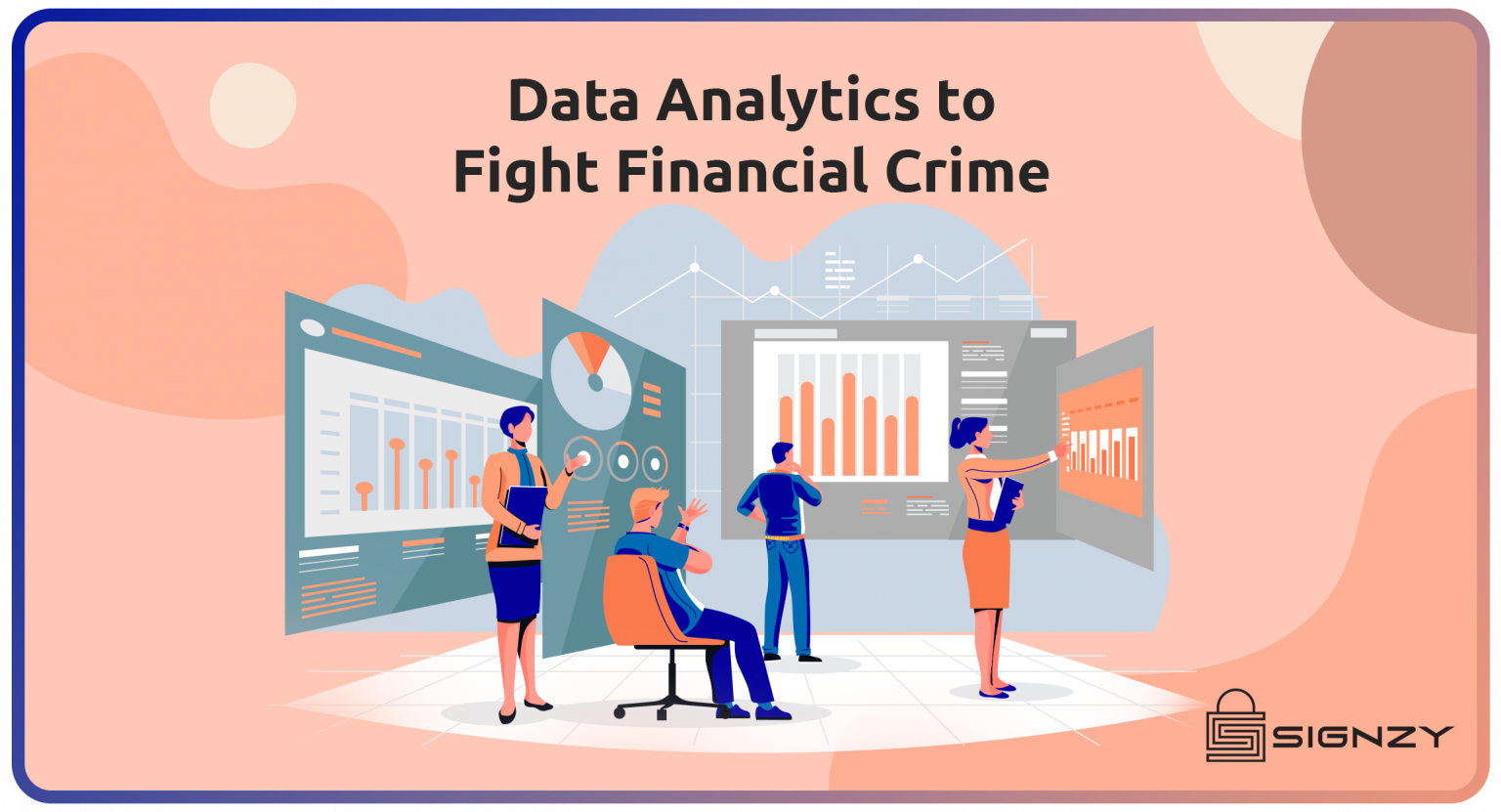Combating global financial criminal activity, from money laundering and market misconduct to sanctions, terrorist financing, bribery, and corruption, costs an estimated US$1.3 trillion annually, according to a 2018 Refinitiv Survey. Moreover, with global regulators imposing nearly US$26 billion in fines in the last decade for non-compliance with AML(Anti-Money Laundering), Online KYC(Know Your Customer), and Sanctions regulations, there is a material need for change. Exploratory data analytics can bring this about
Governments and regulators put financial companies on the front line to fight against financial crime with increasingly rigorous compliance requirements. However, trade institutions are finding it challenging to meet these expectations due to legacy technologies and manual processes that no longer keep up with the vast volumes of information produced and the complexity of the global banking ecosystem.
Banks innovating and adopting new technologies and techniques to address regulatory compliance demands will be industry leaders in the years to come.
Time To Evolve The Fintech Industry With Exploratory Data Analytics
Conventionally financial companies have relied heavily on manual, human intervention in the regulatory reporting process. This remains the common practice today, particularly in the case management workflow. For example, several case investigators review details and write disposition narratives physically before suspicious activities and other compliance issues are reported to them.
However, with the flow of information in and out of banking systems, humans can’t keep pace with demand. As a result, risk alert backlogs are growing faster than operations teams can handle, more often than not. We can use advanced and exploratory data analytics techniques such as AI, machine learning, natural language processing, and cognitive automation to accelerate or automate a significant portion of the labor-intensive work. This reduces operational costs and leaves people free to focus on preventative interventions.
As well as decreasing operational workloads in case management, compliance teams also leverage advanced analytics in many preventative financial crime use cases, including enriching the KYC process, enhancing sanctions screening performance, and monitoring transactional activity, helping to identify risks and opportunities proactively.
Machine learning models accelerate the closure of a risk alert backlog and have a higher degree of accuracy.
Innovation- Solution to Legacy Issues Using Exploratory Data Analysis
Following are the three examples of opportunities for financial companies and banks to use innovative and exploratory data analytics methods and technologies to improve regulatory compliance, enhance customer experience and lower the cost of operational risk management.
Transaction Monitoring (TM)
In Anti-Money Laundering, ML models enrich transaction monitoring alerts and boost SMR(Suspicious Matter Report) conversion rates – and predict AML scenarios before they occur. In addition, enrichment adds potentially essential details about the customers, beneficiaries, or accounts associated with the respective alert, such as:
- Using previous cases, SMRs or TTR(Transaction Threshold Reports)
- Existing scoring processes that assess the potential risk of a transaction, customers, series of transactions, or accounts
- External information such as subpoenas, law enforcement inquiries, or negative news
Machine learning models detect “true positive” results with improved accuracy than traditional methods and even predict significant events before they occur.
Online KYC– Know Your Customer
Organizations must collect, manage, verify, and validate customer data for KYC checks and compliance to implement the required due diligence and permit apt customer risk assessments or investigations. However, building a comprehensive ‘single view of the customer’ spanning various source systems and multiple digital interactions has been a challenge for financial companies.
KYC checks and verification have traditionally been manual and inefficient processes, often combined with critical data gaps, errors, and quality issues. However, it’s possible to achieve a better perspective of the customer, enhance the data used to implement due diligence, and provide a contextual basis for determining customer risk and detecting suspicious activity by augmenting human activity with machine learning techniques. So now we can use Online KYC.
Analytics also enables customer segmentation and productive profiling for various business purposes, including compliance and marketing. For example, compliance teams could use customer profiles for risk assessments or investigations. Likewise, enterprises or marketing teams could use this data to create personalized banking offers based on customer preferences.
Effective Sanctions Screening
The performance of screening engines is under pressure due to rapidly altering and increasing regulatory demand. Unfortunately, this is accompanied by the fact that the risk detection capacity of existing systems is unable to keep up. As a result, a typical symptom of inefficient screening is an ever-growing backlog of screening alerts and unsustainable levels of false positives, directly impacting operational costs.
At the core of effective screening, the solution is an uplift of the completeness and the screening engine ingesting the data’s accuracy. Therefore, calibrating the matching and filtering performance of this effective screening engine needs the data to be of high quality, complete, and ultimately resulting in a boost in true positives detection rates and operational efficiency.
In addition to ensuring the screening, the engine is fully operating at peak performance; emerging AI and other analytical assistive options can also be used to address operational efficiency issues related to a particular case investigation.
Machine learning techniques can be combined with predictive calculations based on historical investigator decisions to substantially reduce the number of alerts to be safely dispositioned. In addition, the effort and cost involved are reduced by building processes that result in complete and accurate data and properly optimizing the engine to avoid false positives.
An intelligence-led and data-driven Fight In The Fintech Industry
Financial companies are being challenged internally and externally to keep up with the onerous demands of mitigating financial crime risks. Organizations are finding innovative ways to address issues surrounding SMR conversion rates, KYC due diligence, and screening alert management.
Banks have an increased appetite to go beyond simply flagging suspicious and illegal activities for compliance purposes. The aim is to leverage data and effective technology to cost-effectively identify potential criminal behavior and prevent illegal activities from occurring. Complete and accurate data is vital to resolve these issues, and the uplift of data quality will immediately affect the existing monitoring and screening engines’ performance.
Conclusion
Advanced analytics, such as AI, machine learning, and automation, can help filter out false positives and improve inefficiencies in existing investigative processes. As a result, there are many opportunities for data and analytics to drive efficiencies and operational cost reductions and, more importantly, to identify intelligence-led and data-driven ways to tackle financial crime.
For all of this, you need the best resources you can get. We at Signzy identify your needs and help you forge the solutions using our AI-driven API resources, which are completely customizable. Check out our website to learn more.
About Signzy
Signzy is a market-leading platform that is redefining the speed, accuracy, and experience of how financial institutions are onboarding customers and businesses – using the digital medium. The company’s award-winning no-code GO platform delivers seamless, end-to-end, and multi-channel onboarding journeys while offering totally customizable workflows. It gives these players access to an aggregated marketplace of 240+ bespoke APIs that can be easily added to any workflow with simple widgets.
Signzy is enabling ten million+ end customer and business onboarding every month at a success rate of 99% while reducing the speed to market from 6 months to 3-4 weeks. It works with over 240+ FIs globally, including the 4 largest banks in India, a Top 3 acquiring Bank in the US, and has a robust global partnership with Mastercard and Microsoft. The company’s product team is based out of Bengaluru, and it has a strong presence in Mumbai, New York, and Dubai.
Visit www.signzy.com for more information about us.
You can reach out to our team at reachout@signzy.com
Written By:

Signzy
Written by an insightful Signzian intent on learning and sharing knowledge.



